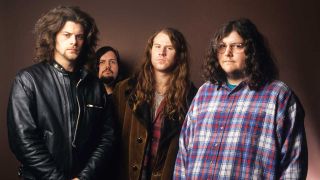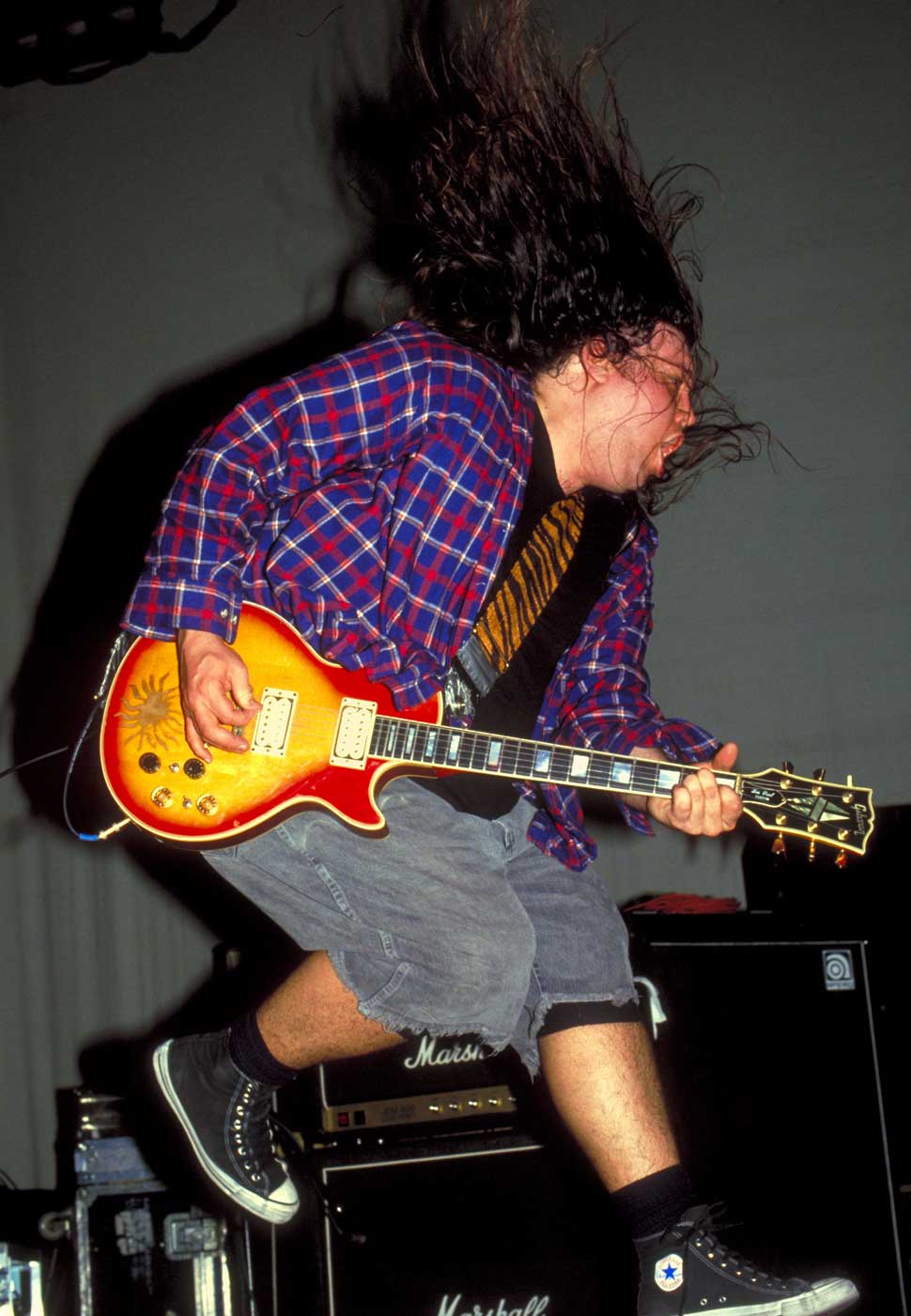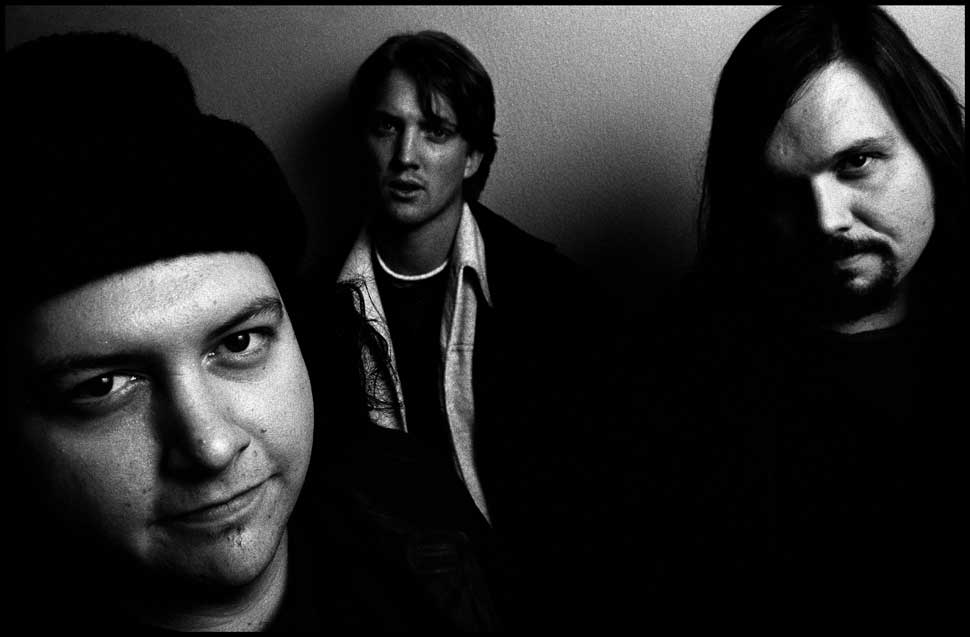Darn Trees Yelling at Me Again
A tale of Screaming Trees, Mark Lanegan, hard drugs and epic infighting

It'due south an October night in 1992 in Asbury Park, New Jersey, and the salty wind is blowing in off the body of water. Bruce Springsteen made his proper noun writing near these mean streets, although that's not what the Screaming Trees are thinking well-nigh as they mill around in front of a bar named The Fast Lane.
None of the Seattle band are what you'd call small; drummer Barrett Martin is over half-dozen feet tall, and the remainder of them – 300lb guitarist Gary Lee Conner and his equally hefty bassist brother Van Conner, plus vocalist Mark Lanegan – loom over him. But that doesn't end a gang of locals rushing them as they stand up outside.
The Trees are scrappers from way back, not least among themselves. They've never gone down in a ball, and they're not about to start now. Fists fly back and forth between the flannel-clad musicians and the agglomeration of local meat-heads, until the latter realise in that location's going to be no satisfaction from trying to take downwards a gang who steadfastly turn down to fall. The gang disappear into the night, the only sign they were ever there being the cuts and bruises left on the bemused band members.
They check themselves for harm. Mark Lanegan sweeps back his mane of hair to reveal a shiner around his center. Barrett Martin realises that he can't enhance his arm; he's confused his shoulder. None of this would normally be a problem – they've been in plenty of fights before. Just tomorrow night the Screaming Trees are due to brand their national Goggle box debut on Late Night With David Letterman.
They practise make it, fifty-fifty if it's not quite in i piece. Picket their performance of hit-single-that-never-was Most Lost You lot on that show now, and Lanegan looks like he's been staring through a telescope with ink around the eyepiece. Just he fared better than Martin, who didn't even go far on set. They look and sound as ferocious as a ring who had been in a bar brawl 24 hours earlier should await. But while that sort of thing is fine on the stage of some club in Washington state, it doesn't sit so well on national Telly.
The Letterman appearance encapsulates the Screaming Trees' proven ability to snatch defeat from the jaws of victory. Betwixt 1985 and their divide in 2000 they released seven albums, at least ii of which should accept made them as big as their more celebrated Seattle peers. That they never made it was down to whatsoever number of things: drink, drugs, in-fighting, image, bad timing or bad luck. Maybe a combination of all of them.
"We didn't have a damn thing in common except insanity," Marking Lanegan said later. "So we fought a lot."

Things were placidity in Ellensburg, Washington in the tardily 70s and early on 80s. A small logging town 107 miles east of Seattle, information technology was home to Gary Lee Conner and his younger blood brother Van, likewise as Mark Lanegan. Today, Van Conner remembers the town equally a refuge for under-achievers; for Lanegan it was a place where if you weren't working a shitty job, then you lot were drinking or listening to music.
The immature Conner brothers spent every spare cent they had on records. On a shopping trip in 1981, while withal in loftier school, they picked up a re-create of Black Flag'southward pummelling Harm. Information technology was similar nothing else they'd e'er heard. By Van's admission, information technology opened him up to music completely.
By contrast, Marker Lanegan was a high-school quarterback who fancied himself as a future sports star, even if his groundwork suggested otherwise: past the time he was 18 he had been arrested several times for various misdemeanours, including public drunkenness, shoplifting and – prophetically – drug possession (the last time he was arrested, he dodged jail simply by like-minded to spend a year in a treatment plan). But while Lanegan was a jock, he as well loved music. He and Van would occasionally run across up to pore over the singles they'd both bought.
After leaving high schoolhouse, Van and Gary Conner experimented with a series of curt-lived bands with drummer friend Mark Pickerel. Lanegan would bring together them to chug beer and jam. Soon they realised that he was a amend singer than Van. For the band, Lanegan'south wounded, menacing whisper was an epiphany; future Screaming Trees/Nirvana producer Jack Endino would afterward call him the best vocalist in Seattle. Not that Lanegan'southward presence helped them get noticed.
"We couldn't even get a gig in Ellensburg," Gary Lee Conner recalls of the nascent Screaming Trees. "People thought we were consummate shit. We didn't fifty-fifty know how to write songs. But I put some stuff on my 4-track and played information technology for Lanegan, and he thought we should really attempt and do something with them."
No one knew what was absurd, or cared. The four of them would heed to Hüsker Dü and Air conditioning/DC. Later they'd cover the Pocket-sized Faces vocal Vocal Of A Baker, and Van would call his son Ulysses afterwards Cream'south Tales Of Brave Ulysses. They ploughed these disparate influences into a demo, 1985's psychedelia-tinged Other Words, released by local label Velvetone.
The Conners' parents lent them money to tape the following year's full-length debut, Clairvoyance. To their surprise, it sold two,500 copies – impressive for a band from the backwaters of the Pacific Northwest in the pre-grunge 80s.
With zip to autumn back on, the Trees threw themselves into the life of a touring underground rock band. They spent the next few years criss-crossing the Us in a van for months at a time, playing every dark and sleeping on strangers' floors. Then they'd head dwelling to Ellensburg to piece of work and save upwards to make another tape and bout over again. Lanegan, for one, took a number of jobs picking peas, building fences and working in the Conner family unit's video shop where the ring too rehearsed.
By the terminate of the 80s the Copse had released another 3 albums: 1987's Even If And Especially When, 1988's Invisible Lantern and 1989'due south Buzz Factory, all on pivotal US cloak-and-dagger label SST. But tensions were growing. That Gary Lee Conner insisted on writing most of the ring's fabric was causing consternation. As Lanegan would recall: "He was really into a psychedelic thing, which I wasn't into. He hadn't even eaten acid, which I'd been selling for a number of years."
The problems often turned physical. During sessions for Fizz Mill (which turned out to be their last record for SST), producer Jack Endino was surprised to walk out of the control room to run into Van and Gary Lee wrestling on the floor. "I had to run out and move a bunch of mic stands," says Endino, "It was like Clash Of The Titans. I looked at the other guys in the band and they were, like: 'Yeah, they practice this all the time.' It was scary and serious, but it was funny too."
Seattle in 1990 was a city on the brink. Soundgarden'southward Louder Than Beloved and Nirvana's Bleach had turned heads the year earlier, while Mother Dear Bone's march to success had been halted merely by the untimely death of their singer, Andrew Wood, from a drug overdose.

The Screaming Copse had moved to Seattle to get serious. Dorsum in Ellensburg, the band members barely hung out together, and rehearsals were hit and miss. Even Lanegan would admit that a move to the bigger urban center could get them motivated. Despite their protestations that they didn't go at that place to get part of any scene, they would accept been bullheaded and deaf not to detect what was going on effectually them. Information technology didn't take long for major characterization Epic (future habitation of Pearl Jam) to sniff them out.
"Soundgarden were the only other band signed to a major when we got picked up," says Van Conner. "I call up Alice In Chains were getting their deal at about the same fourth dimension as the states."
The first fruit of their major-label deal was their fifth album, Uncle Anesthesia, co-produced by Terry Engagement and Chris Cornell (whose then-wife, Susan Silver, managed the Copse) and released in January 1991. Easing back on the psychedelia, it brought them a minor hitting in Bed Of Roses.
Simply while the rest of the world was being swept forth by Seattle'southward charms, they were finding the Screaming Trees easier to resist. The band didn't help themselves. Lanegan was chronically backwards in coming frontward in interviews, and the burly Conner brothers were hardly typical MTV heart-processed. The ring didn't intendance how people saw them, and behaved accordingly. Tellingly, they cancelled the endmost dates of the Uncle Anesthesia bout because they were too drunk to continue.
In 1992, every bit the band began work on their adjacent anthology, Sweet Oblivion, Barrett Martin replaced original drummer Mark Pickerel. In that location was, Martin recalls, "a definite tension in the band, a fine rest between existence artistic and beingness destructive". Fights in the studio were rare, and unremarkably confined to the brothers, ane of whom would ordinarily end upwardly sitting on the other. But outside the studio, things were getting increasingly night, not to the lowest degree for Lanegan, who was simultaneously in the grip of heroin addiction and trying to record his 2d solo album (the offset, The Winding Canvas, was released in 1990).
Despite all that, the band managed to produce one of the great records of the era. Regal and night, Sweetness Oblivion represented grunge's classic rock wing. Information technology would become on to sell a quarter of a million copies, and the swirling Nearly Lost You fifty-fifty gave them a Top 50 U.k. hit.
For the first fourth dimension in their career, the Screaming Trees were in the driving seat. Just the wheels were virtually to fall off. Lanegan was up to his eyes in habit, and alcohol had the best of the rest of the band. Stories abound of one band member cutting himself with a straight razor on the band's passenger vehicle, or stubbing out cigarettes on his forehead.
While the Screaming Trees were decorated damaging themselves, bigger forces were sabotaging the band. In Fall 1992, Ballsy insisted they support label-mates Alice In Chains. "Nosotros were meant to headline theatres around America and Europe, bigger rooms than those Alice were going to play, simply Sony insisted that nosotros open for them," says Martin. "They threatened not to back up our records if nosotros didn't do it; they acted like gangsters."
The following summer they found themselves opening for MTV-friendly i-hit-wonders the Spin Doctors. "Us and the Spin Doctors," says Martin, disbelievingly. "Playing support is not how to brand a career out of a ring."
In the end, the Screaming Copse toured for two years on the dorsum of Sweet Oblivion, and when they finally finished they found they were no further forth than before. Worse, they were wearied and trying to deal with their various problems. It was not a good time to work on a follow-upward.
We were itching to go, merely nobody's energy was at the level information technology was when we did Sweet Oblivion," says Martin. "Nosotros were trying to put our personal lives back together once again."
Things just wouldn't spark, and initial sessions at the get-go of 1994 were scrapped. By their own admission, the songs they'd recorded simply weren't strong enough. Some were ditched birthday; others, such as Dying Days, Black Bible, and Silver Tongue, would eventually make it on to subsequent records. "It was too shortly," said Lenegan. "None of us were ready to collaborate."
In 1995 the Screaming Trees were finally corralled into a studio for several months with Black Crowes producer George Drakoulias. The unremarkably combative band were worn downwardly by the procedure of writing and recording, although ironically, the resulting album, Dust, was arguably their virtually consequent tape. Fired by Lanegan's earth-weary growl, the likes of All I Know and the magnificently coloured Halo Of Ashes owed more than to American blues and folk than to punk stone or psychedelia. Potent and stirring, it was a record out of fourth dimension in every sense.

For the live shows, the band brought in Josh Homme – while he was nevertheless on the rebound from Kyuss – as second guitarist. Lanegan took to him instantly, claiming that the band tempered their behaviour appropriately: "Nosotros didn't want to act up too badly in front of the child."
It wasn't enough to go along the vocalizer on the straight and narrow, and in the midst of touring Dust he was arrested for possession of crack and forced into rehab. He spent the next eight months in a drug treatment facility in Joshua Tree.
"Lanegan's one of the greatest singers of my generation," says Martin. "And in retrospect it's improve that the Copse missed that world tour, considering anybody in the band is still effectually. If nosotros had stayed on the road, that might non be the example."
It was the winter of 1998 when the Screaming Trees went into Stone Gossard's Studio Litho to record what would be their terminal album. Van Conner says that the ring had parted visitor with Epic and were looking for another bargain; Barrett Martin says they simply made the record for the hell of information technology. But they concord that the mood within the band couldn't have been further abroad from the chaos and simmering animosity of Dust.
"Nosotros were merely hanging out with no label, no tour, not much of anything really," says the drummer. "I said: 'Fuck the corporation and that bullshit, let's just go in and record these songs while we're even so together in Seattle'."
The band paid for the sessions themselves, with Martin producing. Despite the fact that the likes of Ash Grey Lord's day and Revelator were every bit good as anything from Sweetness Oblivion or Dust, the record failed to act equally bait for the record companies. The labels hadn't just lost involvement in the Screaming Trees, they'd long agone lost interest in Seattle itself. The Copse had neither the energy nor inclination to carry on. When they played their final show, on June 2000, their final album remained unreleased.
A decade on, Van Conner was surprised when Barrett Martin mentioned putting the terminal Screaming Trees record out. The drummer had moved back to Seattle a few years earlier and had been thinking about the band's legacy. He had done a rough mix of the anthology in 1999 and given all the members a copy on CD; Martin was the only one who had hung on to his. He dug out the tapes and took them to Jack Endino. The producer was blown away by the songs, and the pair decided to mix it properly and release information technology.
"I knew I'd have to get permission from the other guys, so I sent them my rough mix," Martin recalls. "Fifty-fifty Lanegan was like: 'Wow, these are really good. Put 'em out.'"
The album was finally released in 2011 every bit Last Words: The Final Recordings, via the drummer'south characterization, Sunyata Records. Even though Van Conner says it's "for old-school Copse fans – I don't know if the rank and file volition care", information technology's hands proficient enough to sit alongside Dust and Sweet Oblivion.
Martin has played with countless outfits since the Trees split, including his ain jazz rock ensemble the Barrett Martin Group, and Walking Papers with Guns Northward' Roses bassist Duff McKagan. Van Conner's band Valis released their about contempo album Minds Through Space And Fourth dimension in 2021, the aforementioned year Gary Lee Connor unveiled his most contempo solo album, Revelations in Fuzz.
Marker Lanegan joined Queens Of The Stone Age later the Trees' dissolution, released several highly acclaimed solo albums, and became an in-demand collaborator. When he died, on February 22, 2022, at the age of 57, he'd been clean for ii decades.
"The Trees were an incredible band that rode the lightning," Martin told us in 2011, "And Mark's recovery, subsequently all the shit that he and the rest of us had been through, was the greatest part of all: the triumph of the spirit."
The original version of this article originally appeared in Classic Rock #167, in Feb 2012
Source: https://www.loudersound.com/features/the-story-of-the-screaming-trees
0 Response to "Darn Trees Yelling at Me Again"
Post a Comment